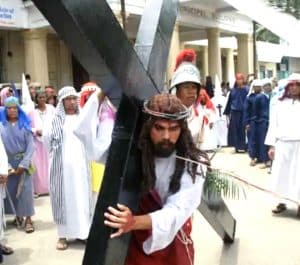
(UCAN): Fidelino Josol takes pride in being part of the Penitentes, an all-male centuries-old Catholic fraternity, that organizes the re-enactment of Passion of Christ during the Holy Week.
“I joined the group as a member when I was 20,” Josol, 56, a resident of Palo town in the central Philippines, told UCA News.
Defying advanced age and health problems including intermittent headache, insomnia, and body pains, Josol has been an active group member providing all possible support for holding the Passion of Christ on Good Friday. The event is organized along with local civic and religious organizations.
On Good Friday, Palo’s town square gets crowded with visitors from various areas of Leyte province as well as the Eastern Visayas region who arrive to watch the dramatisation of the final hours of Jesus’ life before Crucifixion.
Josol, a schoolteacher, attends the ritual “for the atonement of all my sins.”
He joins other Penitentes to walk barefoot under the scorching summer sun in full and colorful regalia, praying with rosary beads worn around his neck and a woolen cord tied around his waist.
Instead of doing self-flagellation during Lent as a sign of penance, Josol and his company would help the priests during religious processions and rituals and solicit donations for the parish during the Holy Week celebration
On March 27, a Wednesday of this year’s Holy Week, he assisted 20 new members to join the group. In the solemn investiture ceremony, the new members were given their special robes at the Palo Metropolitan Cathedral, which Pope Francis visited in 2015.
The group is active in all Holy Week liturgy and rituals.
During the Good Friday procession, the Penitentes act as marshals and pallbearers of various religious statues and icons.
As we celebrate the 500 years of Christianity in the Philippines. The Chaplaincy to Filipino Migrants organises an on-line talk every Tuesday at 9.00pm. You can join us at:
https://www.Facebook.com/CFM-Gifted-to-give-101039001847033
Instead of doing self-flagellation during Lent as a sign of penance, Josol and his company would help the priests during religious processions and rituals and solicit donations for the parish during the Holy Week celebration.
For a more meaningful Good Friday, which centres on the Catholic tradition of puasa (fast and abstinence), the Penitentes also distribute molabola, a delicacy unique to Palo.
The members take the molabola (milled sticky rice fashioned into tiny balls and cooked in coconut milk and sugar) as their food on Good Friday.
Each one does not only make a sacrifice for his own sake but like the Lord himself vicariously suffers for others
Monsignor Gilbert Urbina
Spanish origin
The group is believed to have its origins in Spain. The members wear cone-shaped hoods that cover their faces while carrying religious statues and icons during the Holy Week processions.
The tradition dates back to the 15th-century rituals in Santa of Andalusia, Spain.
In 1894, Spanish Franciscan priest Pantaleon de la Fuente, who worked in Palo town from 1887 to 1898, introduced the Penitentes to add drama to the Holy Week observance.
The historical import of the tradition to the Philippines has been attested by Jesuit historian Father Pedro Chirino, according to Church sources.

The Latin word “Paenitentia/ae” and Spanish “Los Penitentes” means sinners or wrongdoers, who repent their misdeeds.
“The Penitentes seek for forgiveness, atonement, reparation, and penance for the sins they may have committed through sacrifice and self-mortification in the form of sincere and genuine services rendered to the church, especially during Lenten Season,” Josol said.
Monsignor Gilbert Urbina, vicar general of Palo Archdiocese, said the Penitentes tradition is as old as Christianity in the Philippines.
“As an organised and officially recognised parish organisation, the Penitentes of Palo portray the penitential mood of the parish and embody the penitential acts of all the parishioners,” Urbina said earlier.
The Penitentes seek for forgiveness, atonement, reparation, and penance for the sins they may have committed through sacrifice and self-mortification in the form of sincere and genuine services rendered to the church, especially during Lenten Season
“Each one does not only make a sacrifice for his own sake but like the Lord himself vicariously suffers for others,” he added.
In the 1950s, the late Don Pio Pedrosa, a prominent local Catholic, donated to the confraternity vestments, rosary beads, and religious articles, Josol said.
That was also the time when confraternity was institutionalised with a hierarchical ranking and assigned tasks.
The colour and design of vestments differentiated the membership and ranks. Married members wear navy blue robes with pointed hoods; unmarried members wear violet or deep purple robes with black blunted hoods; and officials and senior members have all-white robes and pointed hoods.
The task of procession marshals was given to the unmarried Penitentes, while the married members carried on their shoulders the different “carrosas or andas (carriage)” of the religious icons.
For their respective task, the white Penitentes are responsible for taking down the image of the Crucified Christ from the cross and bringing it to its crypt after the “Seven Last Words.”
They were also considered the honour guards of the Santo Entierro or the statue of the dead Jesus Christ, giving them the sole responsibility of pushing the wheeled carriage of the statue during the procession around the town and keeping guard to it during the vigil.
Currently, the Palo Penitentes has about 500 men. It was registered as a non-profit in 2004.
People across the country, and even foreigners come to Palo to join the Holy Week celebration, Josol said.
“Thus, the Penitentes has been a permanent fixture in the religious history, culture, and tradition of Palo and will remain as such for years to come,” he added.
Membership is given to a male Palo resident on the recommendation of a bonafide member, who vouches for the sincerity and moral integrity of the candidate.










